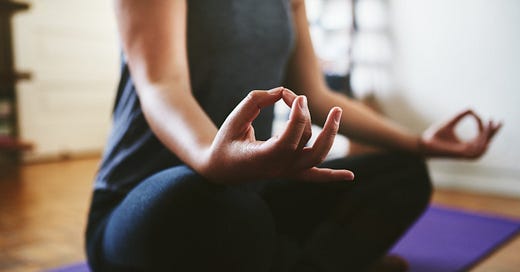Do You Need to Calm Down?
Recent evidence suggests that the nervous system has more influence over cancer formation than we realized.
During COVID, my hot yoga studio closed, and I still miss that community. Over the past several years, I’ve met lovely people via online spaces and am grateful for the instructors who continue hybrid offerings. Recently, however, I’ve been longing for an in-person experience, and so I’ve been visiting local studios.
Over Christmas break, I signed up for a class that met in the basement of a non-descript office building at the edge of town, relatively close to our farm. On a rainy Tuesday evening, I entered the warm space, placed my shoes in a cubby and unrolled my mat.
A spry, elderly woman hopped over to introduce herself as the instructor and insisted that I would need props. I demurred but she loaded my arms with blocks, straps, and blankets anyway. As I glanced around the room, I realized that I and another newbie were the youngest attendees by several decades.
After a brief fight with Zoom, the five of us in the studio and those attending virtually were off. We stretched deeply and exhaled slowly. We used chairs to support aging knees and to ensure proper alignment in basic postures. The experience was forgiving and supportive. For example, when assuming a warrior two pose, our instructor told us to imagine an invisible friend pulling our trailing arm gently back and I watched as everyone’s spine straightened into near perfect alignment, including mine.
After class, an older man in a black track suit, shared that he was skeptical of chair yoga when he began attending through the Silver Sneakers program at his local YMCA. Three years later, he said proudly, I can bend my right knee again. He grinned proudly as I watched his foot move up and down. I didn’t think I would ever be able to do that again, he said as we walked (slowly) to our cars.
There is no evidence (yet?) that yoga can cure or prevent cancer. There is a plethora of evidence, however, that yoga can improve symptoms and quality of life in cancer survivors.
A recent study, for example, randomly assigned 500+ cancer survivors across the U.S. to 75 minutes of restorative yoga twice a week for a month while the control group received standard patient education. (s/o to Cancer Culture subscriber Tom K who recruited many patients to this study!!) All other medical care was the same.
The results were chosen this summer to be presented at the largest cancer conference in the world (only the absolute best studies are chosen). The presentation showed that the yoga group had significantly lower levels of inflammatory markers in their blood compared to the non-yoga group. And you may think, so what. Big deal. However, some of these markers have been associated with longer and more severe side effects of cancer treatment, higher risk of cancer recurrence and development of future cancers.
This finding is not unique. Unlike expensive and unproven “anti-inflammatory” supplements and diets, mind-body practices like qigong, tai chi and yoga have consistently been shown to reduce fatigue, temper anxiety and improve overall quality of life in cancer survivors.
And it doesn’t take that much time investment by cancer survivors to see results.
When analyzing all studies looking at the impact of yoga on cancer-related fatigue, researchers found that 150 minutes per week for eight weeks or less was effective in reducing fatigue. And doing more did not add more benefit. **note 150 minutes of moderate exercise per week is also recommended by the CDC, AHA, and many other groups for maximum health benefits.
Importantly, no study to date has shown a detriment to people or cancer survivors who engage in mind body practices like yoga. I’m not suggesting yoga is substitute for other healthy behaviors or takes the place of physical therapy or medications. However, the evidence shows it is effective for managing the side effects of cancer treatment without many downsides.
What about yoga to prevent cancer?
Many of us are contemplating New Year’s resolutions. Should yoga be included?
For the answer, we have to think about what yoga actually does for us.
The link between a stressful lifestyle (correlated with higher baseline levels of cortisol or “adrenaline”) and cardiac death has been well established, but the link to cancer is still unclear.
A recent analysis of 41,000 healthy individual showed that those with long term and extended exposure to stress were three times more likely to die of cancer than those with a lower stress exposure.
Whoa. What does that mean? Does living in chronic “fight or flight” mode start to wear on us at a cellular level? Or are stressed out people also exposed to other risk factors for cancer? We don’t know the answer to those questions yet.
A closer look at the relationship between the nervous system and cancer formation might provide the answers.
A Nature article published in 2019 generated quite a bit of controversy. French scientists found that in animal models, stem cells migrated from the brain to a tumor, forming complete neurons and communication pathways. Cancer cells seemed to be forming their own nervous system. Yikes!

A 2023 article summarized the current state of research exploring the link between the nervous system and cancer. The authors suggest that cancer cells:
release factors to attract neurons
respond to neurotransmitters which are known to cause cancer growth and spread
are capable of establishing their own neural networks which can facilitate communication between the primary tumor and metastases.
Tricky bastards.
But if this is true, could we use medications that modulate the nervous system like anti-depressants, anti-psychotics, and anti-seizure medications to treat cancer? Or perhaps explore what “dose” of neuro-modulating activities like yoga could help?
The research is far from clear, but the fact that scientists are at least talking about this possibility gives me hope.
For now, what I can tell you for sure is my regular yoga practice results in less muscle tightness and an overall sense of calm in my life. The best way I can describe it is that my shoulders move away from my ears and my heart opens just a bit more. My hips don’t complain as much when I ride Sebastian longer than I planned.
In her bestselling book Eat, Pray, Love, Elizabeth Gilbert shares this wisdom:
Imagine that the universe is a great spinning engine…you want to stay near the core of the thing – right in the hub of the wheel – not out at the edges were all the wild whirling takes place, where you can get frayed and crazy. The hub of calmness – that’s your heart. That’s where God lives within you. So, stop looking for answers in the world. Just keep coming back to that center and you’ll always find peace.
What do you think? Can yoga help return the body from the wild whirling of cancer treatment and back to the hub?
Could cancer prevention be as simple as a Taylor Swift song and we all just need to calm down?
On my mind…
If you are a cancer survivor or caregiver interested in yoga, please connect with a group in your area or try an online class with Hirsch Wellness. All of Hirsch’s offerings are free thanks to the vision of its founder, Louise Grape.
Married at First Sight host Mel Schilling is the latest young celebrity to announce a colon cancer diagnosis. The rise of colon cancer in younger people is concerning and the cause is unknown.
Another study was published this week showing zero benefit to ivermectin in patients with COVID-19. Very sad that millions of dollars were wasted on expensive randomized trials when a small phase 2 trial would have likely been adequate.
Are you watching the British spy drama Slow Horses? If not, stop what you are doing and tune in. It is SO GOOD!











Interesting. One hundred and fifty minutes of yoga per week is quite a lot, but if I had cancer I would make the commitment. It’s entirely possible that I already have a very quiet cancer. For sure, I carry mounting stress in these alarming times. Will I go back to yoga and do more of it than I have ever done?
Got caught up with the science today but will look at it again. I feel I've been studying stress all my life. They say stress is the cause of 95% of all illnesses. I believe it. I've had a chronic cancer for 14 years. When I got it, I realized the stresses I'd accepted as part of life, were a choice. Big huge realization. Cancer can be a wake-up call, not the beginning of the end.